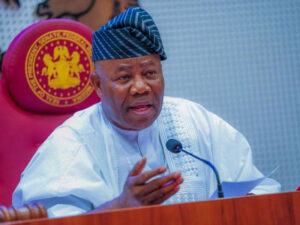The Nigerian Senate has firmly denied allegations that senators receive N21 million monthly in salaries and allowances. Senate spokesperson Yemi Adaramodu (Ekiti South) issued this clarification on Thursday in response to comments made by Senator Sumaila Kawu.
Kawu, during an interview with the British Broadcasting Corporation’s Hausa Service on Wednesday, claimed that his total monthly earnings, including salary and allowances, amounted to N21 million. He added that his monthly salary, after deductions, was slightly over N600,000.
In a statement personally signed by Adaramodu, he stressed that running costs should not be confused with the salaries and personal allowances of lawmakers, which are determined by the Revenue Mobilisation, Allocation, and Fiscal Commission (RMAFC).
Earlier, RMAFC Chairman Mohammed Shehu clarified that each senator’s monthly salary and allowances total N1,063,860. Adaramodu reiterated that running costs are not personal allowances or salaries but are allocated for the operation of senators’ offices.
“These funds are retired by relevant officers after being used for official purposes and must be accompanied by proof of genuine expenditure,” Adaramodu stated. He also noted that such funds cover expenses for constituency office staff and other operational needs.

Expressing concern over the narrative of wasteful spending by the parliament, Adaramodu emphasized that the Senate comprises accomplished professionals, administrators, and industry leaders who are driven by patriotism rather than financial gain.
“For the umpteenth time, the Senate is compelled to respond to obsolete allegations of phantom salaries and personal emoluments spuriously credited to Senators monthly,” he said. “The Revenue Mobilisation Fiscal Allocation Commission, the agency of government that fixes political officials’ salaries and allowances, has duly disclosed the monthly personal take-home of Senators.”
Adaramodu also pointed out that all arms of government, including governors, ministers, and state commissioners, operate with running costs, and the National Assembly is no exception. He clarified that the funds mentioned by Senator Kawu Sumaila are meant for daily office operations, oversight functions, and community engagements, not personal allowances.
He concluded by highlighting that the National Assembly operates on a budget that accounts for about 1% of the federal budget, and this allocation has remained consistent even during times of financial constraints. Adaramodu reiterated that the Senate is composed of professionals motivated by a commitment to national service, not financial benefits.




